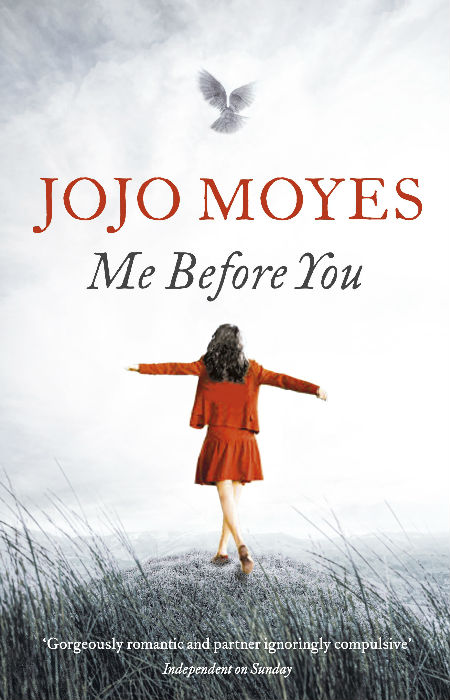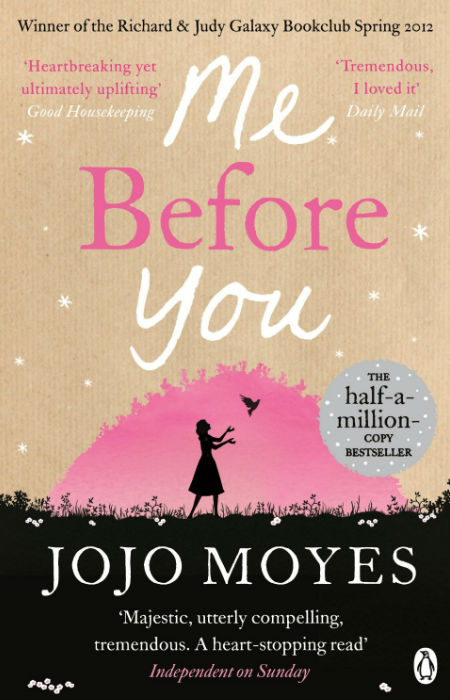
Love, it is generally thought, can pretty much change everything.
Social status, geographical separation, adversarial friends or family, even death cannot compete with love’s ability to sweep all before it in a flood of hope, possibility and rose-petaled wonder.
But in Me Before You by JoJo Moyes, soon to be a major motion picture just in case you’d missed all the hype – the film stars Emilia Clarke aka Daenerys Targaryen (Game of Thrones) and Sam Claflin aka Finnick Odair (Hunger Games) giving it a considerable buzz by dint of star power alone – love has its work cut out for it, pitting one woman’s newly-recovered zest for life against a quadriplegic man’s desire to end it all.
As allies in the pursuit of causes romantic go, Louisa Clark is a formidable ally to have in your corner, even if she is yet to realise how powerful she can actually be.
Newly redundant after the cafe in the small English town in which she lives closes, mid-twentysomething Louisa, who retreated to the safety of family and small ambitions after a traumatic event some eight years earlier, is inclined to take the path of least resistance in all things.
Not for her the grand plans and ambitions of her sister Katrina with whom she maintains a relationship of frenemy-like proportions; rather Louise is a small “l” kind of life girl, happy to potter along with her barely-in-attendance boyfriend Patrick, who seems more devoted to fitness training than her, and grab any job that doesn’t involve sorting chicken carcasses in a factory.
“I felt myself brightening. If he liked music and films, surely we could find some common ground? I had a sudden picture of myself and this man laughing at some Hollywood comedy, me running the Hoover around the bedroom while he listened to music. Perhaps this was going to be okay. Perhaps we might end up as friends. I had never had a disabled friend before – only Treen’s friend David who was deaf, but would put you in a headlock if you suggested that meant disabled.” (P. 39)
It’s not until she reluctantly accepts at a job as a carer for the wealthy family who owns the Castle, the big tourist attraction in town, that she comes across someone in the form of quadriplegic Will, one-time highflying big “L” life corporate wunderkind who is having trouble adapting to his much diminished physical and aspirational circumstances.
Naturally, as befits a grand romantic saga, they detest each other at first, so much so that Louisa considers giving it all up and taking a job sorting chicken gizzards or pole dancing; anything but dealing with snappish, nasty Will.
But then, that is just the spark that ignites a connection between the two that, refreshingly, and thank you to JoJo Moyes for not taking the literary road most often taken, does not immediately lead to love blooming in all its resplendent wonder.

Instead, we’re given a reasonably nuanced, heartfelt look at what it is like, when two people from different classes, differing worldviews and far different physical abilities come into contact with each other and find out there’s more in common that either might have suspected.
That Will, who is determined to end his life at some point convinced his new life is hardly worthy of the name – it’s this focus on assisted suicide and what a disabled person can or cannot do that has attracted some ire from certain groups who feel it promotes euthanasia at the expense of living life; to be fair, that’s not the agenda I took away from the book which if anything gives both sides of the argument an airing – finds his life renewed will hardly come as much of surprise.
So too Louisa’s new found willingness to carpe diem the hell out of life; both are what you’d expected from a book with this sort of narrative.
What is a real joy to read is the way Moyes doesn’t simply leave it at that; rather she goes to a great deal of trouble to give Louisa and Will fully-formed three-dimensional characters and viewpoints, as well as giving full voice in chapters assigned to them to Will’s nurse Nathan, his barely-together mother and father, Camilla and Steven and Louisa’s sister Katrina.
This attention to ensuring the characters, particularly that of protagonist Louisa who is the heart and the soul of this romantically substantial tale, are giving their full due means that Me Before You bears all the hallmark of a book far richer than the one you’d imagine would embody some of its romantic tropes.
“The difference between growing up like me and growing up like Will was that he wore his sense of entitlement lightly. I think if you grew up as he had done, with wealthy parents, in a nice house, if you go to good schools and nice restaurants as a matter of course, you probably just have this sense that good things will fall into place, that your position in the world is naturally an elevated one.” (P. 316)
This is a romantic comedy of sorts full of wit and humour and an antagonistic meet-cute to be sure, but it’s also intelligent and thoughtful, presenting the outcome of Louisa and Will’s expected reunion as anything but assured or conventional.
In fact, the ending may leave you wondering whether Moyes has spent a great deal of time immersing herself in a European sensibility where a sentimentality for easy love and Hallmark-style answers is rarely entertained in favour of telling life like it is.
Granted, it’s not a literary classic that brazenly explores grand themes in difficult and obtuse ways but nor is it a brainless romantic tale, bereft of real characters and issues that matter.
It is, at the end, a wholly accessible but complex in its own way story of what happens when two people come together with big issues are at stake, love blossoms, possibilities abound but life doesn’t exactly follow the script.